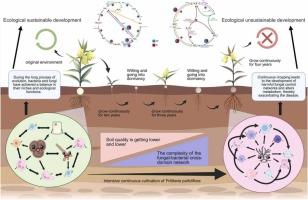The intensive cultivation of perennially grown Fritillaria pallidiflora Schrenk increases the complexity of bacterial-fungal cross-domain networks but reduces the evaluation of soil quality and ecological sustainability
IF 6.2
1区 农林科学
Q1 AGRICULTURAL ENGINEERING
引用次数: 0
Abstract
Understanding how intensive continuous cultivation of perennial plants affects soil biological network complexity and community composition, as well as their relationship with soil quality and processes, is critical for sustainable agriculture development. However, our knowledge in this area remains limited. Here, we investigated the response of soil bacterial-fungal cross-domain networks to continuous cultivation by comparing the rhizosphere microbiome and functions of intensively cultivated Fritillaria pallidiflora Schrenk for 4 consecutive years (2, 3, and 4 years of continuous cultivation) with native ecosystems. Results showed that, unlike annual plant cultivation processes, intensive continuous cultivation increased the complexity of bacterial-fungal cross-domain networks, but reduced soil quality by 48.6 % and ecological sustainability by 77.3 % compared to the native environment. Fungi were found to dominate the microbial networks and tended to adapt to continuous cropping stress and control cross-domain networks through metabolic and ecological functions related to resource acquisition and competitive interactions, while bacteria tended to self-regulate, thereby influencing soil quality. Continuous cropping also led to strong bacterial and fungal impacts on soil nitrogen and sulfur cycling processes. Structural equation modeling revealed a reversal from positive feedback between microbial function and network complexity in native environments to negative feedback in continuous cropping systems. Therefore, our results suggest that intensive continuous cultivation of perennial plants drives changes in microbial community metabolism and interaction patterns that mediate increased complexity of soil bacterial-fungal cross-domain networks, resulting in severe negative impacts on soil quality and ecological sustainability.

多年生白贝母的集约化栽培增加了细菌-真菌跨域网络的复杂性,但降低了土壤质量和生态可持续性的评价
了解多年生植物集约连作如何影响土壤生物网络复杂性和群落组成,以及它们与土壤质量和过程的关系,对农业可持续发展至关重要。然而,我们在这方面的知识仍然有限。通过比较连续栽培4年(连续栽培2年、3年和4年)的白贝母根际微生物群和功能,研究了土壤细菌-真菌跨域网络对连作的响应。结果表明,与一年生植物栽培过程不同,集约连续栽培增加了细菌-真菌跨域网络的复杂性,但与自然环境相比,土壤质量降低了48.6% %,生态可持续性降低了77.3% %。真菌在微生物网络中占主导地位,通过与资源获取和竞争相互作用相关的代谢和生态功能来适应连作胁迫并控制跨域网络,而细菌则倾向于自我调节,从而影响土壤质量。连作对土壤氮和硫循环过程也有较强的细菌和真菌影响。结构方程模型揭示了在自然环境中微生物功能与网络复杂性之间的正反馈与在连作系统中负反馈之间的反向关系。因此,我们的研究结果表明,多年生植物的集约连续栽培驱动了微生物群落代谢和相互作用模式的变化,从而介导了土壤细菌-真菌跨域网络的复杂性,从而对土壤质量和生态可持续性产生了严重的负面影响。
本文章由计算机程序翻译,如有差异,请以英文原文为准。
求助全文
约1分钟内获得全文
求助全文
来源期刊

Industrial Crops and Products
农林科学-农业工程
CiteScore
9.50
自引率
8.50%
发文量
1518
审稿时长
43 days
期刊介绍:
Industrial Crops and Products is an International Journal publishing academic and industrial research on industrial (defined as non-food/non-feed) crops and products. Papers concern both crop-oriented and bio-based materials from crops-oriented research, and should be of interest to an international audience, hypothesis driven, and where comparisons are made statistics performed.
 求助内容:
求助内容: 应助结果提醒方式:
应助结果提醒方式:


